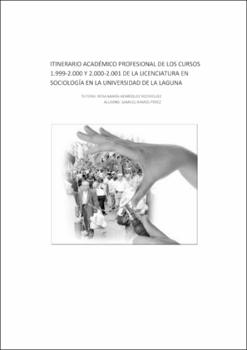Itinerario académico profesional de los cursos 1999-2000 y 2000-2001 de la Licenciatura en Sociología en la Universidad de La Laguna.
Autor
Ramos Pérez, SamuelFecha
2018Resumen
Este trabajo trata de dar respuesta a algunas preguntas que todo estudiante de sociología se ha hecho alguna
vez a lo largo de su carrera. ¿Es la sociología o, más específicamente, mi titulación en dicha materia útil para
abrirme paso en el mercado laboral? ¿A qué obstáculos profesionales habré de enfrentarme? ¿Un máster mejora
mis expectativas laborales de futuro o mejor inicio un nuevo grado universitario? El presente trabajo tiene pues
como intención y objetivo analizar los diferentes procesos académico-laborales teniendo como punto de partida las
preguntas arriba formuladas. Para ello se estudiarán casos relativos a la primera y segunda promoción de
licenciados en sociología, egresados en Canarias y formados en una universidad pública. Es decir, este estudio cubre
un intervalo temporal de doce y once años. De esta forma se pretende recoger el mayor ratio temporal en estudios
de investigación en sociología han dado sobre esta cuestión con la finalidad de rastrear algunos de los perfiles
laborales y educativos de la mano de sus protagonistas. La razón resulta obvia: indagar en la verdadera relación
entre mercado de trabajo y formación universitaria. La iniciativa y objeto de estudio del presente trabajo plantea
por tanto responder a una sencilla cuestión: ¿qué han hecho algunos de los licenciados de la primera y segunda
promoción de sociología en el ámbito laboral y formativo desde que finalizaron sus estudios hasta la actualidad? This project tries to find an answer to some questions that many sociology students have asked themselves
throughout their study years: Is sociology or more specifically, this degree useful to find my way in the labor
market? What kind of professional handicaps will I have to face? Will a Máster´s improve my future work prospects
or will it be better to begin a second degree? This project takes the above mentioned questions as a starting point
from which to analyze the academic and working processes at play for a newly graduate. With this end in mind, I
will study cases from the first and second years of sociology graduates in Canary Islands from a state university. That
is, the time span analyzed covers twelve or eleven years for the first and second year graduates in sociology. This
long time span allows for a deep follow-up of the several work and career profiles achieved by the subjects studied.
In this way, I hope to take to surface the relationship between university studies and work market in the case of
sociology students. In other words, this study intends to portray what these graduates in sociology have actually
done since they finished their university studies





